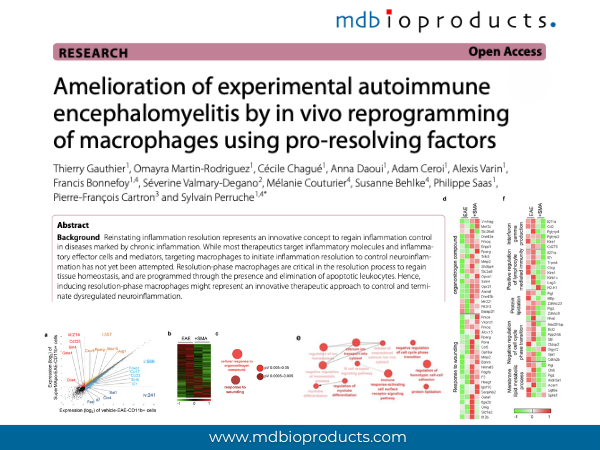
Featured Publication in Focus: Amelioration of experimental autoimmune encephalomyelitis by in vivo reprogramming of macrophages using pro-resolving factors
Feb 05 , 2024
Authors:
Thierry Gauthier, Omayra Martin‐Rodriguez, Cécile Chagué, Anna Daoui, Adam Ceroi, Alexis Varin, Francis Bonnefoy, Séverine Valmary‐Degano, Mélanie Couturier, Susanne Behlke, Philippe Saas, Pierre‐François Cartron and Sylvain Perruche
Université de Franche‐Comté, EFS, INSERM, UMR RIGHT, 25000 Besançon, France.
Pathology Department, Besancon University Hospital, 25000 Besan‐ çon, France.
Team “Apoptosis and Tumor Progression” CRCINA‐INSERM U1232, Université de Nantes Nantes, LaBEX IGO, REpiCGO, EpiSAVMEN, LaBCT, Institut de Cancérologie de L’Ouest (ICO), 44000 Nantes, France.
MED’INN’Pharma, 25000 Besancon, France.
Journal of Neuroinflammation. BMC. 20 December 2023
----------------------
Products referenced:
Catalogue Number: 3038001
Myelin Oligodendrocyte Glycoprotein (MOG 35-55), 25 mg
----------------------
ABSTRACT
Background Reinstating inflammation resolution represents an innovative concept to regain inflammation control in diseases marked by chronic inflammation. While most therapeutics target inflammatory molecules and inflamma‐ tory effector cells and mediators, targeting macrophages to initiate inflammation resolution to control neuroinflam‐ mation has not yet been attempted. Resolution‐phase macrophages are critical in the resolution process to regain tissue homeostasis, and are programmed through the presence and elimination of apoptotic leukocytes. Hence, inducing resolution‐phase macrophages might represent an innovative therapeutic approach to control and termi‐ nate dysregulated neuroinflammation.
Methods Here, we investigated if the factors released by in vitro induced resolution‐phase macrophages (their secretome) are able to therapeutically reprogram macrophages to control neuroinflammation in the model of experi‐ mental autoimmune encephalomyelitis (EAE).
Results We found that injection of the pro‐resolutive secretome reduced demyelination and decreased inflammatory cell infiltration in the CNS, notably through the in vivo reprogramming of macrophages at the epigenetic level. Adop‐ tive transfer experiments with in vivo or in vitro reprogrammed macrophages using such pro‐resolutive secretome confirmed the stability and transferability of this acquired therapeutic activity.
Conclusions Overall, our data confirm the therapeutic activity of a pro‐resolution secretome in the treatment
of ongoing CNS inflammation, via the epigenetic reprogramming of macrophages and open with that a new thera‐ peutic avenue for diseases marked by neuroinflammation.
Keywords Resolution of inflammation, Neuroinflammation, Macrophages, Epigenetic reprogramming, Secretome
To continue reading and to download the publication:
